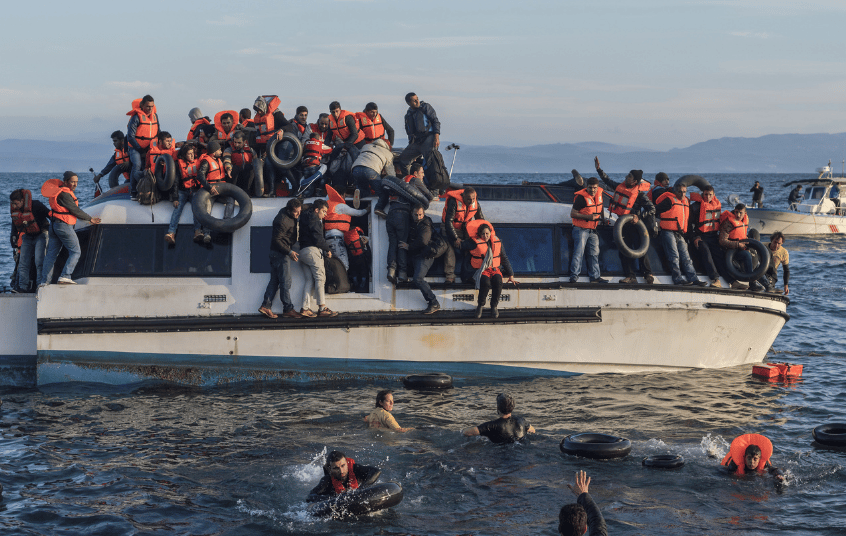Recent days have seen the Migrant Crisis hit the headlines in the UK – here’s a look at what the Migrant Crisis is and what has been happening…
The 2015 Migrant Crisis
The 2010s saw a considerable increase in the number of migrants coming to the United Kingdom as many people fled to escape from war and poverty in the Middle East. In 2014, ISIS came to prominence when they captured the city of Mosul; as refugees fled from the coming destruction, Europe saw a steep increase in the number of migrants, with as many as 1.3 million coming to Europe in 2015 to seek asylum. This sudden influx of migrants increased tensions in many European countries regarding immigration policy, giving it a central position in political discussions and helping to facilitate the rise of populist parties such as UKIP and the Front National in France.
The UK accepted a relatively small number of refugees during the 2015 migrant crisis and the following years, but many, desperate to reach a safe country to rebuild their lives, were willing to risk stowing away inside lorries passing through the Channel Tunnel, or even to purchase passage on smalls boats to make the perilous journey across the English Channel.
How has COVID-19 affected immigration?
Migration to the UK dropped during the COVID-19 Pandemic as measures to restrict the spread of the virus were put into place. Because of these restrictions on legal immigration, coinciding with the lorry driver shortage, an increasing number of migrants are now attempting to make the passage by boat with restrictions eased.
A Resurgent Migrant Crisis
With the easing up of restrictions put in place to limit the spread of COVID-19, more migrants have been able to attempt to come to the UK.
-
In recent weeks, a record number of migrants, upwards of 25,700, have been attempted to enter the UK by boat. In comparison, 500 people attempted the same journey in 2018.
-
British and French joint-security operations have been attempting to reduce the number of boats leaving France and turning back any they catch.
-
French authorities say they have arrested 1,552 suspected migrant smugglers so far.
-
On Wednesday 24 November, 27 people died after attempting to cross the Channel on a dinghy, the largest recorded death toll of such a crossing.
In an attempt to dissuade migrants from making the journey, the UK government has proposed the Nationality and Borders Bill, which could see refugees that attempt to enter the country via unauthorised means, such as by boat, to be treated differently from those who enter the country through standard procedure, allowing them to be processed in an “offshore location”.
A unique problem facing the UK is the inability to return migrants. The EU’s “Dublin III Agreement” allows for migrants to be returned to the first EU member state they can be proved to have passed through. This agreement applied to the UK until January 2021. In 2020 the UK returned over 230 migrants based on the Dublin agreement; in 2021 the UK has returned a total of 5 migrants, according to the Immigration Minister, Tom Pursglove.
Meanwhile, there have been considerable disagreements between the governments of France and Britain regarding the handling of the crisis.
In a letter sent to the French President on 25 November, Boris Johnson seemed to blame the crisis on France and Britain’s exclusion from the terms of the Dublin III Agreement, stating:
“If those who reach this country were swiftly returned, the incentive for people to put their lives in the hands of traffickers would be significantly reduced”
Mr Johnson also suggested, as a means to lessen the crisis:
-
Joint maritime patrols throughout both nations’ waters
-
The use of ground sensors and radars to detect boats attempting to cross the Channel
-
Airborne surveillance by both manned and unmanned aircraft
-
Expansion of the real-time intelligence sharing of the Franco-British joint intelligence cell
President of France, Emmanuel Macron responded by accusing the British Government of not being serious in its treatment of the crisis, noting that the letter included several proposals already rejected by the French government. The French government have since rescinded their invitation to Home Secretary Priti Patel to represent the British Government at a talk organised to discuss solutions to the crisis, due to happen on 28 November, with representatives from Belgium, Germany, and the Netherlands expected to be present.



